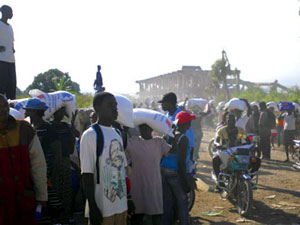-Staff Writer-

WASHINGTON (FinalCall.com) – There is the Haiti that President Obama recently described: “The situation on the ground remains dire and people should be under no illusions that the crisis is over,” he said following a meeting with Haitian President René Preval.
With spring rains coming, the president noted, “The challenge is now to prevent a second disaster.”
Then there’s this Haiti: “The situation on the ground in terms of the medical situation has improved,” according to José Ruiz, a civilian spokesman for the United States Southern Command. “Demand for medical care is not exceeding the capacity of facilities on the ground.”
The real Haiti is more like the situation described by President Obama, according to TransAfrica’s President Nicole Lee, who recently returned from the Black republic. Speaking at a March 23 press briefing, she said, “When President Obama says that the situation in Haiti is dire, he is right. People are hungry and sleeping in the open. Only a small percentage of Haitians in need of medical care and food are receiving it on a regular basis or at levels high enough to make a real difference. We need to sustain our humanitarian efforts until emergency needs have been met.”
TransAfrica organized a forum featuring experts from the RFK Center for Justice and Human Rights and the Institute for Justice and Democracy in Haiti to report on their experiences in Haiti.
Monika Kalra Varma, director of the RFK Center, recalled her testimony earlier in the day to the Inter-American Commission on Human Rights. She explained that in 2008 over half a billion dollars was pledged to Haiti after the hurricanes. Only 15 percent of that ever reached the country, she said.
“For several years, the organizations present here today have tried unsuccessfully to track pledges of foreign assistance made to Haiti, to monitor the amounts actually delivered, and to assess project implementation. It was extremely difficult–verging on impossible–to do this because an infrastructure to track funds does not exist,” said Ms. Varma.
“Haitians have a right to have a say in how funds are spent in their country, and they should have recourse if projects are poorly implemented, not implemented, or are doing harm to their communities. Rhetoric from international officials supports rights-based principles such as transparency; however, unless member states take specific steps to create concrete mechanisms, it will be nearly impossible for the Haitian government and especially impacted Haitian communities to follow the money trail.”
Mario Joseph is the managing attorney of the Bureau des Avocats Internationaux (BAI) in Port-au-Prince, Haiti. The BAI assists and represents those who suffer civil, political, economic, social and cultural rights violations.
“Violations of economic and social rights after the earthquake are massive and felt throughout the country. The violations are also all interconnected: the violation of one right leads inexorably to the violation of other rights.”
He explained that Haitians are forced to live in public parks and on the streets and have slept outside for more than two long months–and when the rains arrive they will be absolutely desperate.
“According the United Nations, for two months, 1.3 million of my fellow citizens– more than twice the population of the District of Columbia–have lived in spontaneous camps for internally displaced people. No one knows how many ‘lucky people’ sleep, as I do, in a car or in the yard of their homes,” he said. “Seventy-three percent of people interviewed by LAMP for Haiti said that a lack of food was one of their primary priorities, 53 percent had not received any food aid … 70 percent in the camps.
Mr. Joseph said up to the present, food aid distribution has been poorly coordinated. The aid has generally been distributed in disorder. “At times, women have been forced to trade sex to obtain a voucher to feed their families,” he said.
TransAfrica urged the Obama administration and Congress to:
– Maintain emergency relief efforts at their highest levels: Currently, the United Nations and large international aid agencies have prioritized distribution to only 19 major camps in Port-au-Prince, leaving the majority of those affected by the earthquake without access to food, water, and shelter.
– Decentralize the triage: In addition to the capital city, the earthquake has devastated several major cities in the country. An estimated 600,000 people have left the Port-au-Prince area for the rural areas. The migration has sparked an immediate need for food, shelter, and sanitation in earthquake affected areas outside of Port-au-Prince and in those rural areas now hosting displaced people.
– Adhere to international standards: There is anecdotal evidence that humanitarian agencies have not uniformly applied international humanitarian standards of ethics and practice in creating camps and in disposing of rubble and waste.
Nicole Lee wrote from Port au Prince, “There is still overwhelming need in Port-au-Prince and the surrounding area. No one should be deceived. People desperately need medical care, shelter and food. We need to remain vigilant and provide effective assistance. The need for clean food and real shelter is even exacerbating the need for healthcare. Aid is still trickling and has not nearly met the need.”












